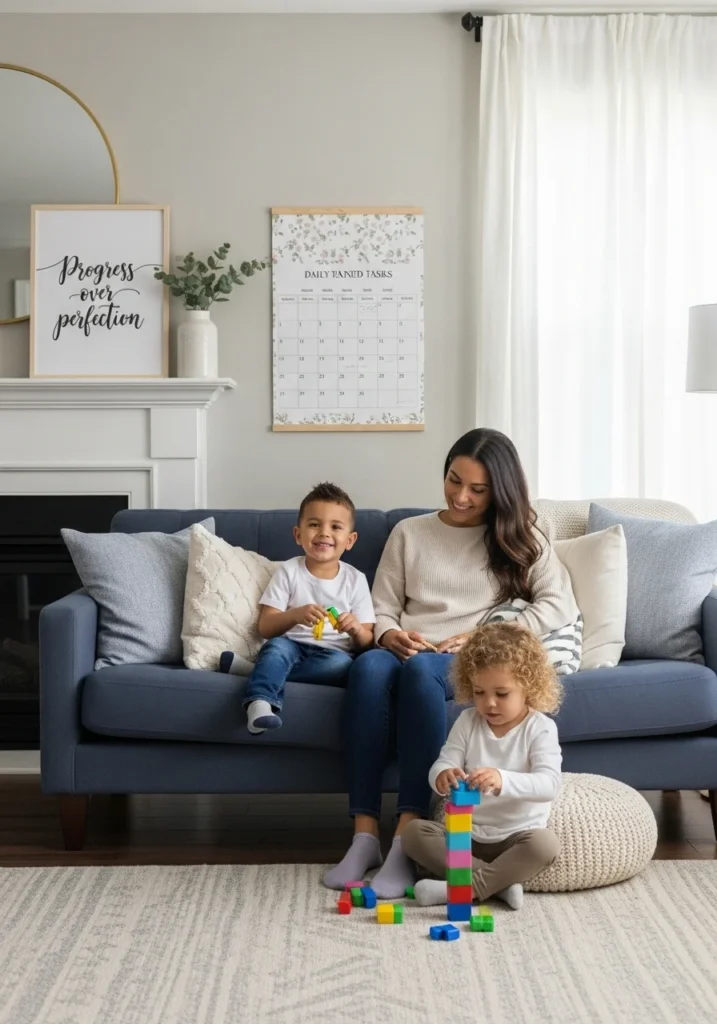Introduction
Being a working mom means you wear more hats than most—career professional, caregiver, chef, chauffeur, and household manager, all rolled into one. Between school drop-offs, work deadlines, meals, and bedtime routines, it can feel like there just aren’t enough hours in the day. Amidst the chaos, trying to keep your home clean and organized might feel like an impossible task—or one that always gets pushed to the bottom of your to-do list.
But here’s the good news: maintaining a clean home doesn’t have to mean spending hours scrubbing and tidying every day. With a realistic and strategic daily cleaning schedule, you can keep your home feeling fresh, manageable, and under control—without the stress or burnout. The key is working smarter, not harder, and focusing on small, consistent habits that fit naturally into your busy routine.
In this blog, you’ll discover a practical, no-fuss cleaning plan designed specifically for working moms. Whether you have 10 minutes or half an hour, this schedule helps you stay ahead of mess and clutter by breaking tasks into quick, daily goals. Plus, it’s totally customizable—so whether you’re working full-time, part-time, in the office, or at home, you can adjust it to suit your family’s unique needs.
So, if you’re ready to spend less time cleaning and more time enjoying your home and your family, keep reading. Let’s simplify your cleaning routine—and reclaim your peace of mind.

Why Working Moms Need a Cleaning Schedule
Let’s face it—being a working mom is one of the busiest and most demanding roles anyone can take on. From managing career goals and client meetings to packing lunches, helping with homework, and tucking kids into bed, the responsibilities are endless. In the middle of all this, trying to keep the house clean can feel like an uphill battle. That’s where a structured cleaning schedule comes in—not as another burden, but as a powerful tool to simplify your life and reduce overwhelm.
1. Save Time and Energy
A cleaning schedule helps you make the most of your limited time. Rather than spending hours on deep-cleaning marathons during weekends or waiting until the mess becomes unmanageable, a daily plan allows you to tackle small, targeted tasks each day. This prevents burnout and turns cleaning into quick, doable habits instead of overwhelming chores.
2. Reduce Stress and Mental Clutter
Walking into a cluttered home after a long day of work can increase feelings of anxiety and frustration. But when your environment feels calm and orderly, your mind follows suit. A consistent cleaning routine creates a sense of control and peace in your home, making it a more relaxing space for both you and your family.
3. Keep Your Home Tidy and Welcoming
Your home should be your sanctuary—not another source of stress. A daily cleaning schedule keeps your living space looking fresh and welcoming without the need for last-minute cleaning frenzies before guests arrive. It also helps maintain hygiene, which is especially important in homes with children or pets.
4. Set a Positive Example for Your Kids
Children learn by observing, and when they see you following a consistent cleaning routine, it sets the foundation for lifelong habits. It teaches them responsibility, teamwork, and the value of maintaining a clean and organized environment. You can even get them involved in age-appropriate tasks, turning cleaning into a shared family effort.
5. Create More Time for What Matters Most
Ironically, adding structure to your cleaning routine actually frees up more time for yourself. When cleaning is no longer a looming, all-day task, you can carve out more space for what really matters—relaxing after work, spending quality time with your children, pursuing hobbies, or just catching your breath.
A cleaning schedule isn’t about perfection—it’s about balance. With a little planning and consistency, you can keep your home in good shape while still making time for the things that truly matter. Whether you have 15 minutes a day or an hour on the weekend, the right approach will make all the difference.
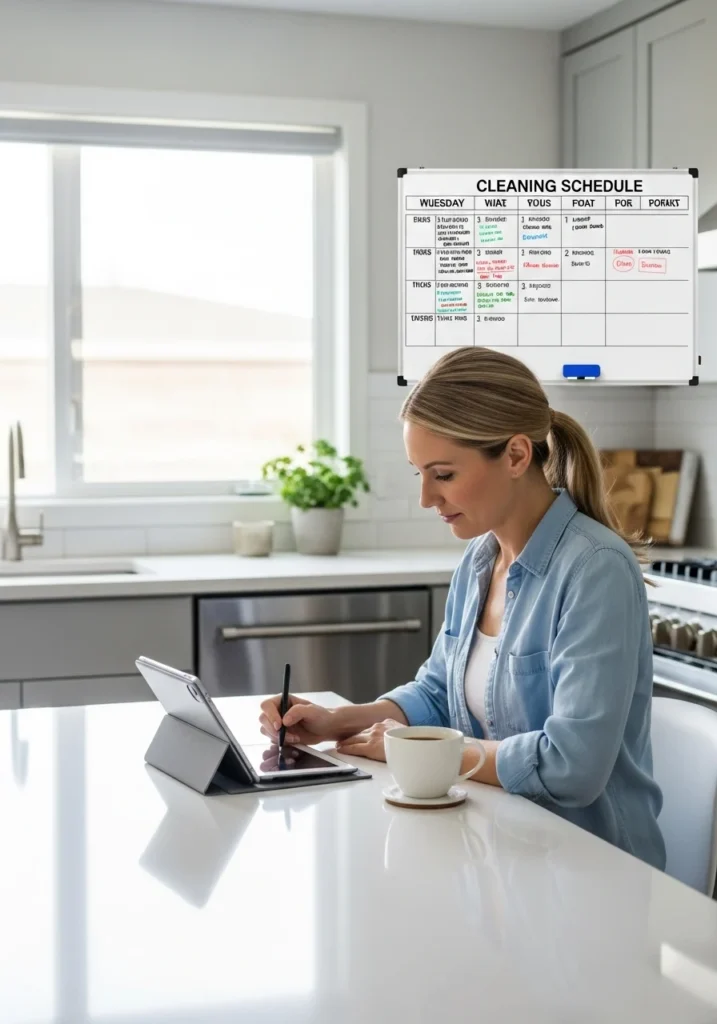
Daily Cleaning Schedule Overview
When life gets busy—and let’s be honest, it always is for working moms—the best way to keep your home clean and your stress level low is to establish a simple, manageable routine. The key is to break your day into small, focused time blocks that align with your natural schedule. That way, you can stay on top of daily messes without feeling like cleaning is taking over your life.
This daily cleaning schedule is thoughtfully divided into three parts: morning, after work, and evening. Each segment is designed to fit into your existing rhythm and only takes a short amount of time—between 10 to 30 minutes—so you can stay consistent without feeling overwhelmed. Let’s explore how each block works and what kinds of tasks you can include to stay on track.
Morning Routine (15–30 minutes)
Your morning sets the tone for the rest of the day. While things can feel rushed, carving out even 15 minutes for some basic cleaning tasks helps create a calm, organized environment that greets you and your family when you return home.
Morning cleaning tasks might include:
- Making the beds
- Loading breakfast dishes into the dishwasher
- Wiping down kitchen counters
- Starting a load of laundry (if needed)
- Doing a quick floor sweep in high-traffic areas
- Taking out the trash or recycling if it’s full
These small but impactful tasks help maintain order and prevent clutter from building up throughout the day. Plus, they make your evening cleaning routine feel much more manageable later on.
After Work Routine (20–30 minutes)
Once the workday ends, the real juggling act often begins—dinner, homework, baths, and bedtime. That’s why it’s important to keep this cleaning block short and focused. This time is ideal for resetting the house after everyone has been home and active, especially in the kitchen and living areas.
After work cleaning tasks might include:
- Unloading the dishwasher and reloading after dinner
- Wiping down kitchen counters and stovetop
- Cleaning up spills or crumbs
- Putting away groceries or lunchboxes
- Sorting and folding the laundry started in the morning
- Quick clutter pickup in the living room or entryway
If your kids are old enough, this is a great time to delegate small tasks like wiping down tables or putting away toys. Sharing the responsibility teaches teamwork and takes a little off your plate.
Evening Wind-Down (10–15 minutes)
The evening cleaning routine is all about ending the day on a peaceful note. This short, final session is meant to prep your home for the next day, so you can wake up to a tidy, stress-free space. Think of it as a “reset button” for your home.
Evening cleaning tasks might include:
- Doing a final round of dishwashing or running the dishwasher
- Wiping down bathroom counters (especially if bath time was messy)
- Putting away stray items (toys, clothes, etc.)
- Setting out clothes or backpacks for the next day
- Fluffing couch cushions or tidying the living room
- Turning on a calming diffuser or dimming the lights for a cozy vibe
Even 10 minutes can make a huge difference. This routine not only keeps your home looking clean, but also helps you mentally unwind and prepare for tomorrow.
By consistently following this simple daily structure, you’ll avoid the dreaded weekend cleaning marathons and enjoy a home that feels tidy, welcoming, and manageable—without sacrificing your valuable time or energy. The best part? These routines become second nature before you know it.
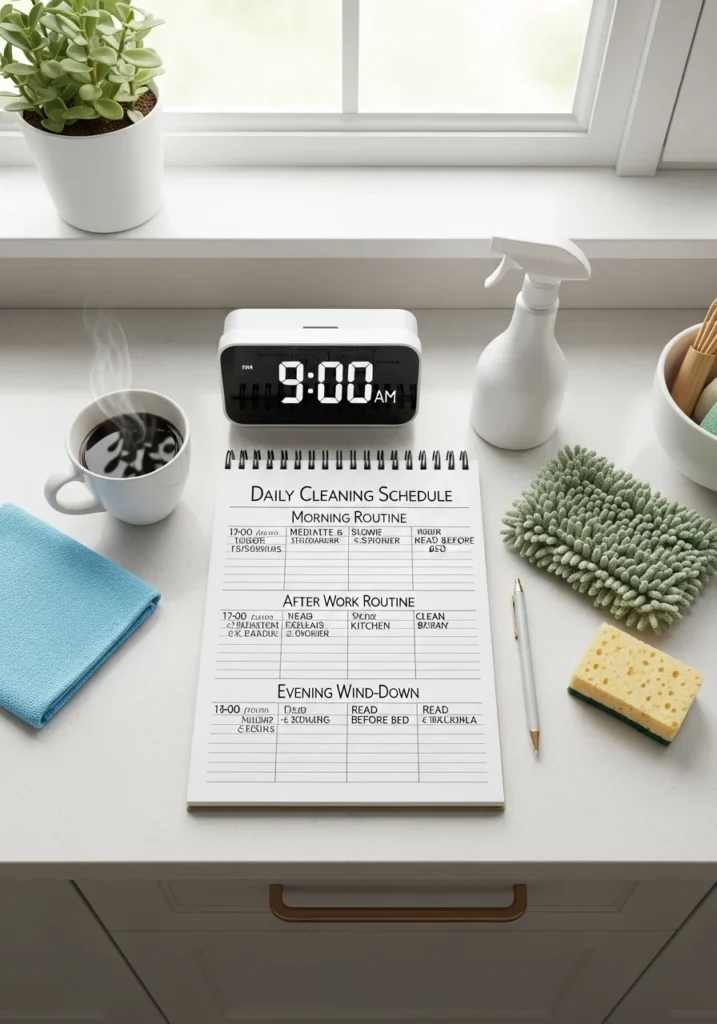
Morning Cleaning Routine (15-30 Minutes)
Mornings can often feel like a whirlwind, especially when you’re balancing work, kids, and other responsibilities. But starting the day with a quick cleaning routine can set a positive, productive tone for the rest of the day. A tidy home—no matter how small the effort—is an instant mood booster, helping you feel more in control and less overwhelmed. The key is simplicity: 15 to 30 minutes is all you need to make your home feel fresh and organized.
Let’s break down the morning cleaning tasks and how each one can help you stay on top of things:
Make the Beds (5 minutes)
Making the bed may seem like a small task, but it has a big impact on the overall appearance of your bedroom. A neatly made bed instantly transforms a room from chaotic to calm. Plus, it’s a quick win that can motivate you to tackle other small tasks throughout the morning.
Why it helps:
- Visually tidies up the space
- Instantly makes the room feel more organized
- It’s a small habit that sets a positive tone for the day
Tip: If mornings are particularly rushed, simplify by pulling the blanket up and straightening the pillows. Done!
Wipe Bathroom Counters (3 minutes)
A quick wipe-down of bathroom counters prevents grime and toothpaste from building up. It takes just a few minutes, but it keeps the space looking fresh and hygienic, especially in high-traffic areas like the sink.
Why it helps:
- Prevents toothpaste splatter and soap scum build-up
- Keeps the bathroom smelling fresh throughout the day
- Minimizes cleaning effort later on by preventing bigger messes
Tip: Use disposable wipes or a microfiber cloth with a multipurpose cleaner. For a fresh scent, a quick spritz of air freshener can add an extra touch of cleanliness.
Unload the Dishwasher (5 minutes)
The dishes seem to multiply, don’t they? Unloading the dishwasher first thing in the morning clears the sink and makes space for the dishes you’ll inevitably need throughout the day. Plus, when you have an empty dishwasher, it’s easy to load dishes as you go, preventing them from piling up later.
Why it helps:
- Frees up kitchen counter space for food prep
- Starts the day with a clean, organized kitchen
- Makes the process of adding dishes throughout the day more efficient
Tip: If unloading the dishwasher feels like a time-suck, consider dividing it into small chunks. Tackle half in the morning and finish when you get home from work. Every little bit counts!
Quick Kitchen Tidy (5–10 minutes)
This is where you do a quick pass through the kitchen, ensuring the counters are clear and ready for breakfast or meal prep. Wipe down countertops, put away any stray items (such as bags or dishes from the night before), and ensure the area feels clean and organized.
Why it helps:
- Keeps your kitchen looking fresh and ready to use
- Reduces clutter, which can contribute to stress throughout the day
- Prepares the kitchen for the next meal, whether it’s lunch, dinner, or snacks
Tip: Focus on high-traffic areas: the sink, stove, and countertops. If you have time, do a quick sweep of the floor or tidy the pantry.
Start a Load of Laundry (2 minutes)
Laundry is one of those never-ending chores, but getting it started early helps keep the pile manageable. Throwing in a load of laundry while you’re getting ready for work means it’s already moving while you’re out of the house. When you get home, it’s ready for folding or drying.
Why it helps:
- Keeps laundry from piling up during the week
- Makes your workload feel lighter by breaking the task into smaller, manageable parts
- Saves you time by running a load while you’re away, freeing up your evening
Tip: If you’re short on time in the morning, consider using a laundry pod or a quick wash cycle. If you can, aim to do one load each day—this keeps the laundry from becoming an overwhelming weekend task.
Tip for Success: Use a Timer to Stay on Track
One of the best ways to stay focused during your morning routine is to set a timer for each task. Even if you only have 15 minutes in total, a timer keeps you from getting distracted and helps ensure that each task gets done without rushing. The structure of a set time per task makes the process feel less daunting and more like a series of small, achievable steps. You’ll be amazed at how much you can accomplish in just a few minutes.
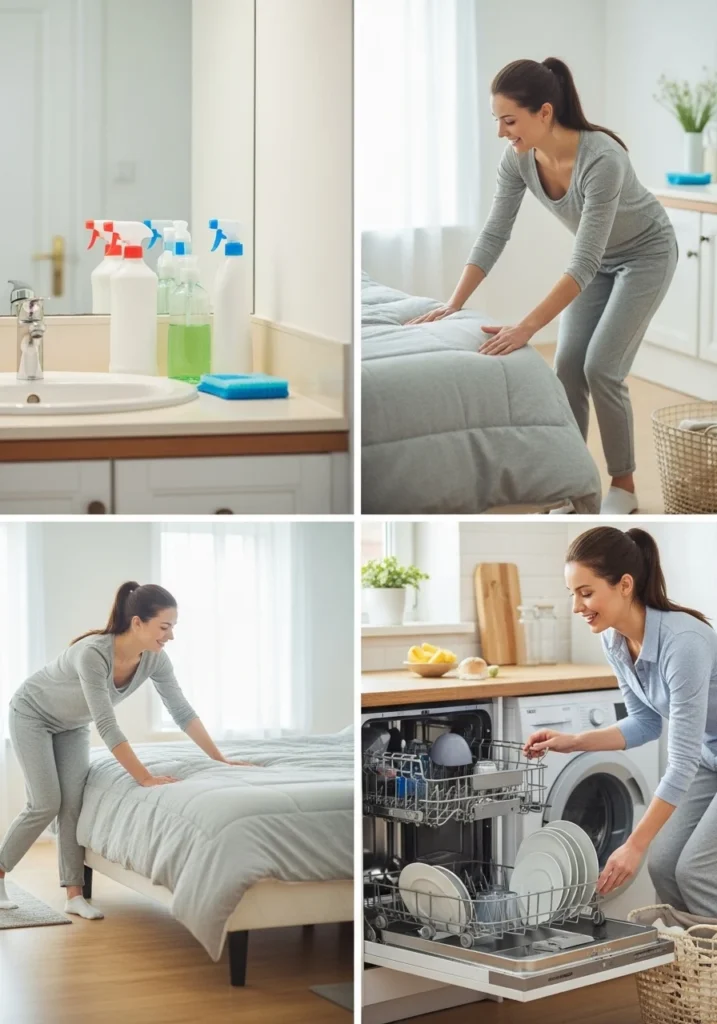
After Work Cleaning Routine (20-30 Minutes)
After a long day of work, the last thing you might feel like doing is cleaning. But with a short burst of focused effort, you can maintain order in your home and ensure that you’re not left with a huge mess by the time the weekend rolls around. The After Work Cleaning Routine is designed to be quick and efficient, allowing you to reset your space and create a calm environment before dinner and bedtime activities begin. In just 20 to 30 minutes, you can get a lot done without feeling overwhelmed.
Let’s dive into how you can make the most of this important time block:
Sort Mail/School Papers (5 minutes)
As soon as you walk in the door, the mountain of mail and kids’ school papers can easily pile up. Sorting through these items right after work helps prevent clutter from building up. Start by quickly sorting through any incoming mail, tossing junk mail, and filing important documents. You can also organize kids’ schoolwork, make sure homework is in their folders, and put away anything that doesn’t need immediate attention.
Why it helps:
- Keeps paper clutter from accumulating on counters and tables
- Ensures important documents don’t get lost in the shuffle
- Keeps your mind at ease by knowing everything has a place
Tip: Set up a small mail sorting station near the door or kitchen to make this process even easier. Have a spot for bills, school papers, and general mail, so you don’t have to hunt for things later.
Switch Laundry (5 minutes)
Laundry tends to build up when we’re juggling multiple things at once, and it’s easy to forget it’s sitting in the washer. After work is a perfect time to switch the laundry. Move clothes from the washer to the dryer or hang them to dry. If you haven’t yet started the laundry, throw in a load now so that it can run while you’re winding down.
Why it helps:
- Keeps laundry from piling up over the course of the week
- By breaking the task into stages (wash, dry, fold), it feels more manageable
- Frees up your evening for relaxation or quality family time
Tip: Fold laundry as soon as it comes out of the dryer so it doesn’t sit in a pile. You can even fold while watching TV or listening to music to make it feel less like a chore.
Tidy Living Room (5 minutes)
The living room is often the heart of the home, where everyone gathers, plays, or relaxes. A quick tidy-up helps reset the space for the evening. Start by fluffing cushions, straightening throw blankets, and clearing away any clutter that has accumulated. If you have kids, quickly gather toys and place them in a basket or storage bins.
Why it helps:
- Creates a welcoming and calm space for your family to unwind
- Helps you stay on top of the clutter so it doesn’t pile up into bigger messes
- Sets a peaceful tone for the evening
Tip: If you have kids, make it a fun activity by racing to see who can pick up the most toys in a minute or two. You can also make this a family affair, so it doesn’t feel like all the responsibility is on you.
Wipe Kitchen After Dinner (10 minutes)
After preparing and enjoying dinner, the kitchen can often feel like a disaster zone. But a quick 10-minute cleanup helps you stay on top of the mess and ensures you don’t wake up to a mountain of dishes. Start by wiping down counters and the stove to remove any crumbs, grease, or spills. Load the dishwasher with any dirty dishes from the meal, and clean any pots or pans you used.
Why it helps:
- Prevents the kitchen from becoming overwhelmed with dirty dishes
- Keeps your kitchen hygienic and ready for the next meal
- Ensures you don’t start the next day with a messy kitchen
Tip: If your kids are old enough, they can help by putting away dishes or wiping down the table. Even little ones can help dry plastic dishes or put away non-breakables.
Quick Bathroom Check (5 minutes)
The bathroom is another space that benefits from a quick after-work check. Spend 5 minutes wiping down sinks, mirrors, and any surfaces where toothpaste or soap scum might have accumulated. If you have time, check the bathroom floor for any towels or clothing that need to be put away. A quick wipe-down prevents grime from building up and keeps the bathroom fresh and presentable.
Why it helps:
- Helps maintain a clean and hygienic bathroom throughout the week
- Minimizes bigger cleaning tasks by staying on top of daily messes
- Keeps the bathroom ready for use, especially when the family is getting ready for bed
Tip: Keep a small bottle of all-purpose cleaner and a microfiber cloth in each bathroom for easy access. A quick wipe-down every day keeps the space cleaner with minimal effort.
Tip: Get Kids Involved!
The beauty of this routine is that many tasks can be delegated to your kids, depending on their age. Not only does this lighten your load, but it also helps teach them responsibility and teamwork. Little ones can help by picking up toys, sorting school papers, or folding small towels, while older kids can assist with laundry or wiping down surfaces.
Why it helps:
- Teaches your kids valuable life skills
- Makes cleaning a shared family effort, so it’s not all on you
- Helps build positive cleaning habits in your children from an early age
Tip: Make it fun! Set a timer and see who can finish their task the quickest. You can also create a “chore chart” to help your kids see what needs to be done each evening.
With just 20 to 30 minutes of focused cleaning after work, you’ll be amazed at how much you can accomplish. This routine helps maintain a tidy home without taking too much time away from your family or relaxation. By breaking up tasks and incorporating your kids into the process, you’ll keep everything manageable and create a smoother transition from work mode to home life.
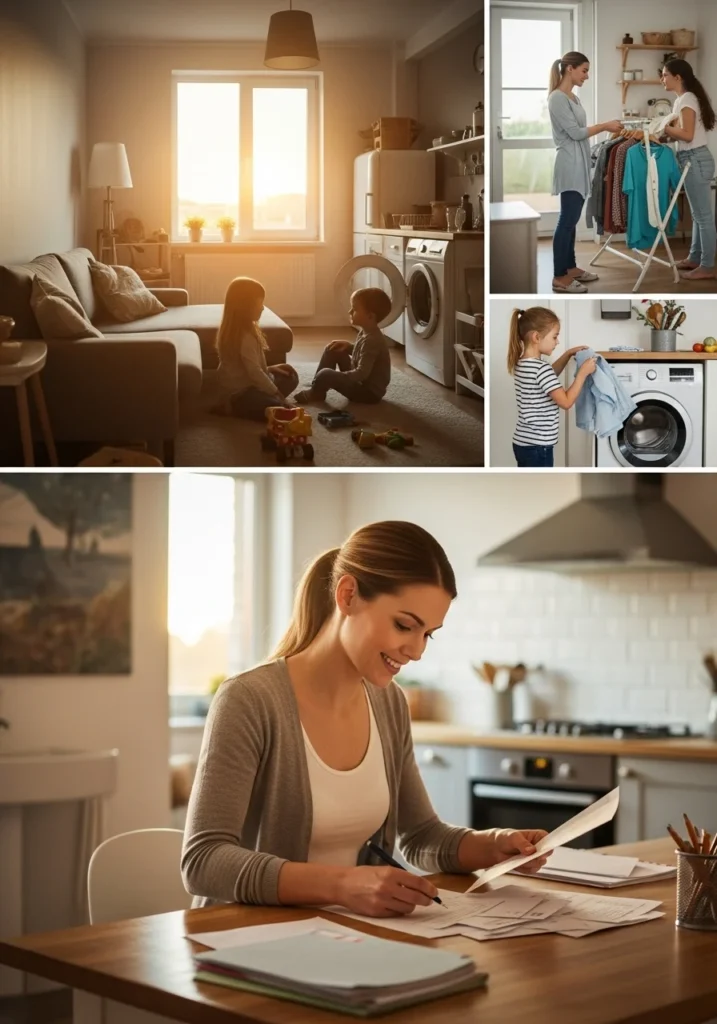
Evening Wind-Down Cleaning Routine (10-15 Minutes)
After a long day of work, household duties, and family time, it’s important to end the day with a sense of calm and order. The Evening Wind-Down Cleaning Routine is designed to be short and simple, providing just enough time to tidy up and prepare your home for the next day without feeling rushed or overwhelmed. These tasks are all about creating a clutter-free environment so you can wake up to a clean, organized space and feel mentally refreshed when you start the day ahead.
In just 10 to 15 minutes, you can finish up small tasks that make a big difference, leaving you with a peaceful, inviting home and more time to relax before bed.
Put Away Clothes (5 minutes)
One of the easiest ways to end the day with a sense of accomplishment is to put away clean clothes. It might be tempting to leave laundry folded in a pile for “later,” but letting it sit overnight can make it feel like a bigger task the next day. Instead, spend 5 minutes folding or hanging up any clean clothes and putting them away, either in your bedroom or in the laundry room.
Why it helps:
- Prevents laundry from piling up and becoming overwhelming
- Keeps your bedroom organized and clutter-free
- Provides a small sense of completion at the end of the day
Tip: If you have a family, consider doing this task together. Even young kids can help fold their own clothes, which teaches them responsibility and encourages teamwork.
Prep for Tomorrow (5 minutes)
A bit of preparation for the next day can go a long way in reducing morning stress. Spend a few minutes getting organized for tomorrow so you can hit the ground running. This could include packing lunches, laying out clothes for everyone, and preparing your coffee maker. If you’re working from home, you might want to set up your workspace or prepare your laptop and materials for the next day’s tasks.
Why it helps:
- Reduces stress and decision fatigue in the morning
- Gives you a head start on the day, helping things run smoothly
- Creates a calming bedtime routine that helps you sleep better
Tip: Keep a “prep station” for family lunches, where you can easily grab snacks, lunchboxes, and any other essentials. A dedicated space can save time and make mornings less hectic.
Quick Floor Sweep (5 minutes)
In high-traffic areas like the kitchen and living room, floors can accumulate crumbs, dust, and debris throughout the day. A quick floor sweep (or light vacuuming if you prefer) can be completed in just 5 minutes, but it helps make a noticeable difference. A clean floor sets a peaceful, organized tone for the evening, and it’s especially nice to wake up to a tidy home the next day.
Why it helps:
- Prevents dirt and crumbs from accumulating, which can make your home feel unkempt
- Provides a fresh start to the day ahead, especially in the morning when you walk into a clean kitchen
- Helps maintain a hygienic environment, particularly if you have kids or pets
Tip: Focus on the most-used areas, like the kitchen, hallway, and living room. If you have time or energy, a quick sweep of the bathroom can also be a nice touch.
Tip: Stick to the Same Time Each Evening to Form a Habit
One of the most effective ways to make your evening wind-down routine feel effortless is to set a specific time each night to complete these tasks. Whether it’s right after dinner or just before you start your bedtime routine, consistency will help form a habit. Over time, these small tasks will become second nature, and you’ll find that they no longer feel like chores but just part of your normal evening rhythm.
Why it helps:
- Consistency helps make cleaning a natural part of your day
- A fixed routine can help you mentally “close the chapter” on your day
- Your home stays in a manageable state, preventing clutter and stress from building up
Tip: Use an alarm or a timer to remind yourself of this wind-down time. It can help signal to your brain that it’s time to finish up the day and transition into relaxation mode.
The Power of Small, Consistent Efforts
The beauty of this Evening Wind-Down Cleaning Routine is that it requires minimal time but offers lasting benefits. By spending just 10 to 15 minutes each evening, you’ll ensure that your home stays tidy, organized, and peaceful, even in the midst of a busy schedule. These small but important tasks will help you start the next day feeling calm and ready, rather than frazzled and overwhelmed.
By consistently taking a few minutes to prep for tomorrow, put away laundry, and tidy up your home, you’ll create a routine that keeps your home running smoothly, reduces stress, and allows you to enjoy more quality time with your family—without feeling like you’re always cleaning.
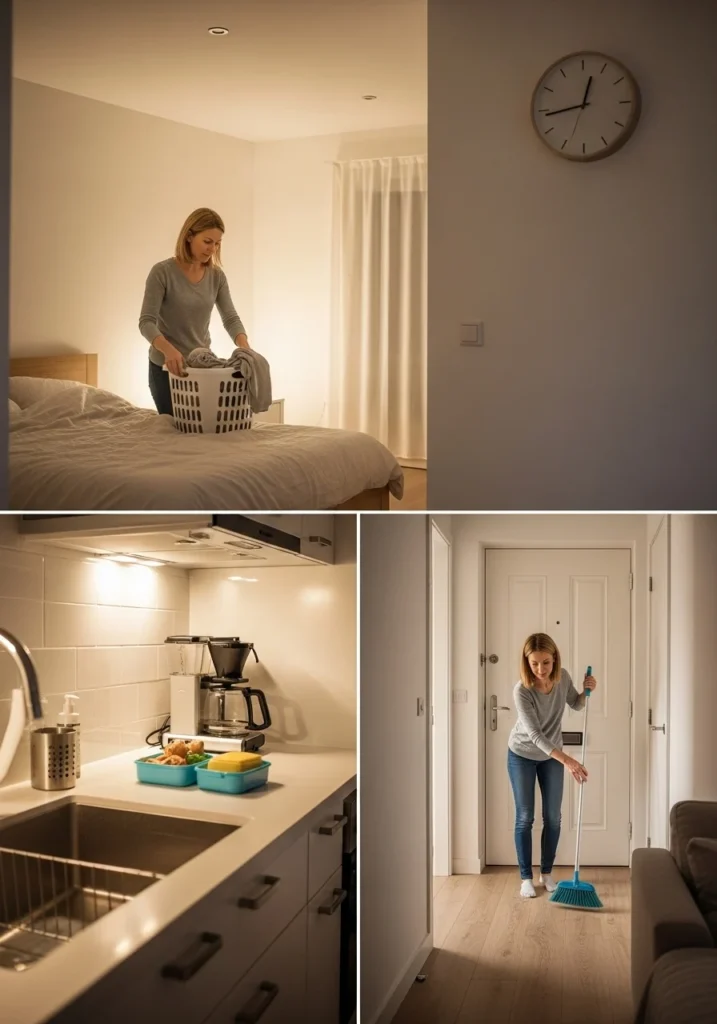
Weekly Add-Ons for Deeper Cleaning
While your daily cleaning tasks help keep your home tidy and manageable, there are certain chores that require more focused, deep cleaning to maintain a healthy and organized environment. This is where your weekly cleaning schedule comes in. By tackling specific areas each day, you ensure that nothing gets neglected and your home remains in top condition.
A consistent weekly cleaning routine also helps prevent small messes from turning into larger, more overwhelming tasks. The key is to space out these deeper cleaning tasks throughout the week, so you’re not left scrambling to clean everything on the weekend.
Here’s a breakdown of a simple weekly cleaning rotation that ensures every area of your home gets attention:
Monday: Clean Bathrooms
Start the week with a deep clean of the bathrooms. After the weekend, bathrooms often need a little extra care to keep things fresh. This task includes cleaning toilets, sinks, mirrors, and showers or tubs. Don’t forget to wipe down any counters and change towels as needed. If your bathroom has a lot of surfaces, it’s a great time to dust off light fixtures and vents as well.
Why it helps:
- Prevents soap scum and water stains from building up in showers and sinks
- Keeps bathrooms hygienic and fresh, ensuring a pleasant experience for everyone
- Establishes a clean and fresh start for the week ahead
Tip: Keep cleaning supplies like an all-purpose cleaner, glass cleaner, and disinfecting wipes handy in the bathroom. This allows you to quickly wipe down surfaces as needed throughout the week.
Tuesday: Dust Surfaces
Dust can accumulate quickly, especially in living rooms, bedrooms, and home offices. Tuesday is the perfect day to tackle the dusting. Use a microfiber cloth to wipe down all surfaces, including shelves, picture frames, baseboards, and furniture. Don’t forget to dust ceiling fans, light fixtures, and vents—areas that are often overlooked but collect a lot of dust.
Why it helps:
- Reduces allergens and helps improve air quality in your home
- Prevents dust from building up on furniture, which can cause surfaces to look grimy
- Keeps your home feeling fresher and cleaner throughout the week
Tip: If you’re short on time, start with the most-used areas, such as coffee tables, TV stands, and kitchen counters, and gradually work your way through the rooms.
Wednesday: Vacuum Bedrooms
Mid-week is a great time to tackle the bedrooms, especially since it’s easy to overlook them during busy days. Vacuuming not only helps remove dust and dirt from the floors, but it also eliminates allergens from carpets and rugs. If you have any fabric furniture, take a few extra minutes to vacuum cushions, under the bed, and along the edges of the walls.
Why it helps:
- Helps keep your sleeping environment fresh and healthy
- Eliminates dirt, pet hair, and dust that can affect air quality
- Maintains the life of your carpet or rugs
Tip: If you don’t have time to vacuum every room, focus on the areas with high traffic or where pets and kids play. Also, consider using a cordless vacuum for quick clean-ups.
Thursday: Mop Floors
Mopping is an essential weekly task, especially for areas with high foot traffic, like the kitchen, dining room, or hallway. Even if you sweep or vacuum regularly, mopping removes sticky spots, stains, and grime that might have built up. Use a gentle floor cleaner suited to your floor type (tile, wood, laminate, etc.) to avoid damaging surfaces.
Why it helps:
- Gives floors a thorough cleaning, ensuring they shine and look polished
- Helps remove dirt that vacuuming or sweeping misses
- Maintains the longevity of your floors by preventing grime buildup
Tip: If you’re pressed for time, focus on mopping high-traffic areas and spots that are visibly dirty. If your floors need a deep clean, set aside extra time to move furniture and clean underneath.
Friday: Clean Kitchen Appliances
After a busy week of cooking, your kitchen appliances could use some attention. Friday is a good day to give them a deep clean. Wipe down your fridge (inside and out), microwave, oven, and dishwasher. Don’t forget to clean behind and beneath appliances, especially the stove and fridge, where crumbs and spills tend to accumulate.
Why it helps:
- Prevents grease and food stains from building up on appliances
- Ensures your appliances continue to work efficiently and last longer
- Keeps your kitchen smelling fresh
Tip: If cleaning your oven feels too time-consuming, try using an oven liner to catch spills in the future. Additionally, use a natural cleaner like baking soda for a gentler approach.
Saturday: Declutter One Area (Closet, Pantry, etc.)
Saturday is a great day to focus on decluttering. Pick one area each week to tidy up and organize. This could be a closet, pantry, or any space that tends to accumulate clutter. Take a few minutes to go through things you don’t need and either donate or throw away items you no longer use.
Why it helps:
- Keeps clutter from overwhelming your home
- Provides a sense of accomplishment by seeing one area in your home transformed
- Reduces stress by creating more organized spaces
Tip: If you’re feeling overwhelmed by the idea of decluttering an entire room, break it down into smaller tasks, like organizing one shelf or drawer at a time.
Sunday: Rest or Catch Up on Anything Missed
After a week of cleaning and tidying, Sunday is your chance to rest or catch up on any tasks you may have missed. Life gets busy, and sometimes certain tasks may get skipped. If you’re feeling up to it, take 15-20 minutes to tackle anything that wasn’t completed during the week. Otherwise, take this time to relax and enjoy your clean home.
Why it helps:
- Gives you a chance to reset and take a break
- Ensures nothing gets left behind, and your home remains in good shape
- Allows you to enjoy the weekend without worrying about cleaning
Tip: If you tend to get caught up in weekend activities, try setting a small “catch-up” time on Sundays, such as 15 minutes after lunch, to knock out small cleaning tasks without it taking over your day.
Why This Routine Works
Having a weekly cleaning schedule ensures that you tackle deeper cleaning tasks on a consistent basis, without becoming overwhelmed. It helps break up chores into manageable, bite-sized portions that can be easily incorporated into your routine. The beauty of this schedule is that nothing gets neglected, and you maintain a clean home without spending hours cleaning all at once.
By committing to this rotation, you’ll ensure that your home remains fresh, organized, and ready for whatever comes your way. Plus, you’ll avoid the dreaded “weekend cleaning marathon,” giving you more time to enjoy your family, your hobbies, or some well-deserved relaxation.
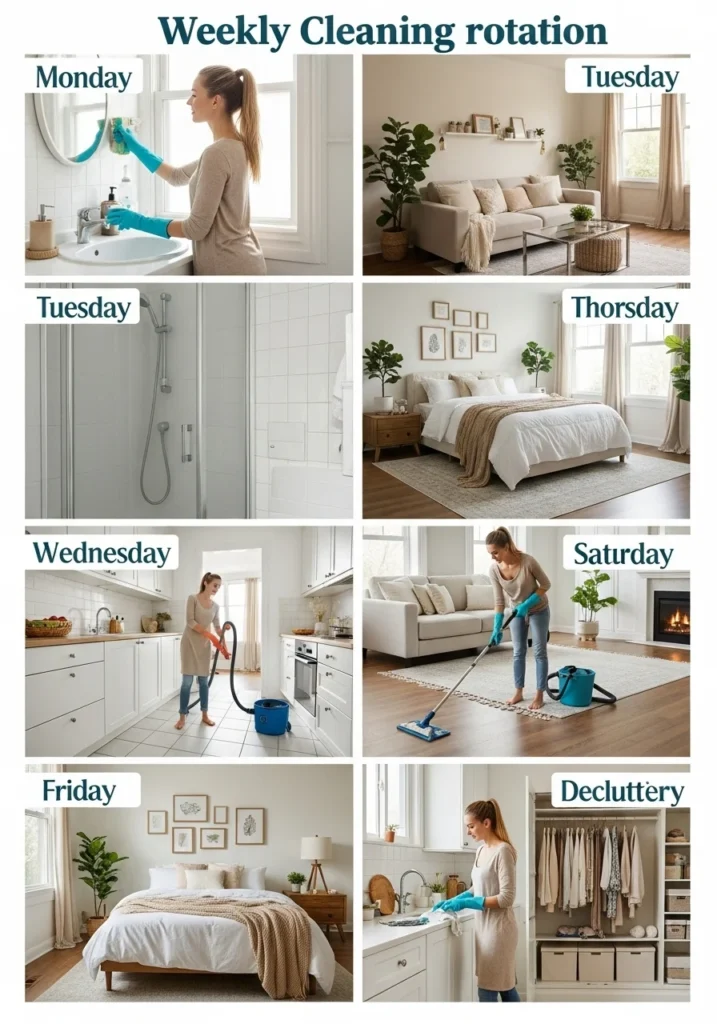
Time-Saving Tips for Working Moms
As a working mom, time is precious, and every minute counts. Finding ways to make cleaning tasks quicker, easier, and more efficient can help you maintain a tidy home without feeling like you’re constantly cleaning. Here are some time-saving tips designed specifically for busy moms who want to keep their home organized while managing work and family life.
Use Cleaning Caddies: Keep Supplies in Each Bathroom/Kitchen
One of the best ways to save time while cleaning is to have all your supplies readily available. Instead of running back and forth to a central cleaning closet, keep a cleaning caddy in each bathroom and kitchen. This caddy should contain all the essential cleaning products you need—like all-purpose cleaner, glass cleaner, disinfecting wipes, sponges, and microfiber cloths—so you can quickly grab it and get to work.
Why it helps:
- No time wasted searching for cleaning supplies, making the task quicker.
- Makes cleaning on the go easier, especially for quick wipe-downs or spot cleans during the day.
- Reduces the chances of procrastination since supplies are always within reach.
Tip: Customize each caddy with the products you use most in that space. For example, the bathroom caddy could include toilet cleaner and shower cleaner, while the kitchen one could have grease-fighting products and a floor cleaner.
Automate What You Can: Use a Robot Vacuum or Dishwasher
Technology can be your best friend when it comes to saving time. If you haven’t already, consider investing in a robot vacuum to handle the daily task of sweeping your floors. Many models are affordable, effective, and can be scheduled to run at specific times, allowing your floors to be cleaned while you’re busy working or taking care of the kids. Similarly, use your dishwasher to its full potential by loading and running it regularly, even if it’s only half-full.
Why it helps:
- Saves you from daily vacuuming and helps maintain cleaner floors with minimal effort.
- Dishwashers save time by cleaning and sanitizing dishes in less time than washing by hand.
- Automated cleaning gadgets take care of the daily tasks, freeing up your time for more important activities.
Tip: Set up your robot vacuum to run in the morning or while you’re away at work so you can come home to clean floors. You can also program it to clean specific rooms if you want more control.
Declutter Regularly: Less Stuff = Less Cleaning
One of the easiest ways to keep your home tidy with minimal effort is to declutter regularly. The less “stuff” you have, the less there is to clean. Take a few minutes each day or week to declutter areas that tend to accumulate items—like counters, the living room, or entryways. Encourage the whole family to pitch in by adopting a “one-in, one-out” rule for new items, which helps keep things from piling up.
Why it helps:
- Fewer items to clean and organize, meaning less time spent on those tasks.
- Easier to find things, reducing frustration and time spent searching for lost items.
- Prevents rooms from feeling chaotic or overwhelming due to clutter.
Tip: Make it a game for the kids to declutter their toys or books for 5 minutes a day. You can even schedule a weekly family “clean-up session” where everyone pitches in and makes the house more organized.
Set a Timer: Race Against the Clock to Make Cleaning More Fun
Cleaning can sometimes feel like a never-ending task, but setting a timer for each task can help you stay focused and efficient. Challenge yourself to complete each chore within a specific amount of time—whether it’s 10 minutes for tidying up the living room or 15 minutes for vacuuming. Not only does this help keep you focused, but it also turns cleaning into a mini race against the clock, making it more engaging and less of a chore.
Why it helps:
- Increases focus and prevents you from getting distracted or wasting time.
- Helps you stay on track and accomplish tasks quickly without overthinking them.
- Adds a fun, competitive element, making cleaning feel like less of a burden.
Tip: Use a fun kitchen timer or download a timer app with upbeat sounds to make the experience more enjoyable. You can even get the kids involved and see who can clean up the quickest!
Multitask: Fold Laundry While Watching TV or Talking on the Phone
Multitasking is a great way to get more done in less time. When folding laundry, consider multitasking by folding while watching your favorite show or talking on the phone with a friend or family member. It’s a great way to turn a mundane task into a more enjoyable one and makes it feel less like a chore. You can also use downtime during the day—like when you’re waiting for dinner to cook or kids to finish homework—to tackle small cleaning tasks.
Why it helps:
- Makes productive use of otherwise wasted time (like TV-watching or phone calls).
- Reduces feelings of overwhelm because you’re combining tasks you already enjoy with necessary chores.
- Allows you to stay on top of cleaning without dedicating separate blocks of time just for chores.
Tip: Keep laundry baskets in each bedroom so you can fold clothes while watching TV in the living room. If you’re talking to family or friends, ask them to help you fold clothes or hand you items to put away!
The Power of Small Changes
Implementing these time-saving tips doesn’t mean you’ll have to overhaul your entire cleaning routine. Instead, it’s about making small, manageable adjustments to your existing habits. By being strategic about how and when you clean, you can save time while still maintaining a clean and organized home.
The key is to find what works best for your lifestyle, and don’t be afraid to adjust as your family’s needs change. With the right tools, mindset, and routine, cleaning will feel like less of a burden and more like a quick, manageable task that you can fit into your busy day.
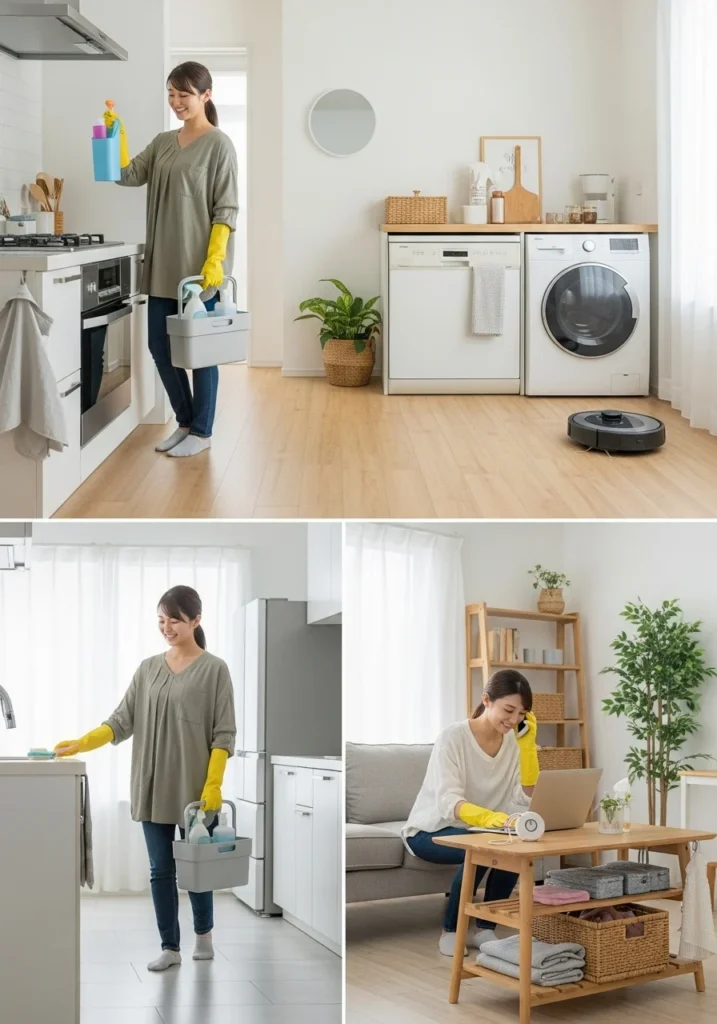
How to Get the Kids Involved
As a working mom, cleaning doesn’t have to be a solo task. Getting the kids involved is a great way to teach them responsibility while also lightening your workload. Children, regardless of age, can participate in household chores in ways that are appropriate for their abilities, and this not only helps you but also gives them valuable life skills.
When kids actively contribute to household tasks, they begin to understand the importance of teamwork, keeping a tidy space, and taking pride in their environment. Here’s how you can involve children of different ages in the cleaning routine:
Toddlers (Ages 2-4): Put Away Toys
Toddlers may be too young to take on complicated tasks, but they can still contribute in meaningful ways. The best way to start is by encouraging them to pick up their own toys and put them away. Toddlers are naturally curious and may enjoy the routine of putting items back in their places. In fact, cleaning up can be a fun game if you frame it as an activity rather than a chore.
Why it helps:
- Teaches toddlers the concept of tidying up and organizing.
- Encourages independence, even at a young age.
- Builds a foundation for developing a sense of responsibility.
Tip: Make it fun by turning it into a game. You can set a timer to see how quickly they can put the toys away, or you can sing a song while cleaning. Consider using colorful storage bins to make it visually appealing and easy for them to understand where things go.
Kids (Ages 5-8): Dusting, Matching Socks, Simple Tidying
As children get older, they can handle more complex chores. Kids between 5 and 8 are ready for tasks like dusting surfaces, matching socks from the laundry, wiping down tables, and putting away small items in their rooms. These tasks don’t require much strength or skill, but they give kids a sense of involvement in the household routine.
Why it helps:
- Builds fine motor skills and a sense of accomplishment.
- Helps them understand the importance of maintaining a clean home.
- Gives them a role in the family, which fosters teamwork.
Tip: Break down tasks into manageable steps and offer guidance as needed. For instance, when dusting, show them how to use a microfiber cloth to pick up dust effectively, or explain how to match socks by size or color. Make sure to praise them for their efforts and show appreciation for their contributions.
Tweens (Ages 9-12): Vacuuming, Dishes, Laundry
By the time kids are in the tween years, they can take on more significant cleaning tasks. At this stage, children can help with vacuuming, doing dishes, or even folding laundry. Tweens are typically strong enough to handle household chores independently and can start to take on more responsibility, especially for tasks like wiping down surfaces and sweeping or mopping floors.
Why it helps:
- Teaches important life skills that will be useful later in life.
- Gives kids a sense of ownership over household upkeep and routines.
- Reduces the amount of work you have to do, giving you more time for other things.
Tip: Allow tweens to take the lead on certain chores. Give them the responsibility to complete tasks from start to finish (e.g., loading/unloading the dishwasher or folding an entire load of laundry). If they make mistakes, don’t stress—guide them gently to show them the correct way. Creating a system for chores, such as a weekly rotating schedule, can help them learn to balance their responsibilities.
Teens (Ages 13+): Full Cleaning Tasks, Meal Prep, Organizing
Teens are fully capable of handling more complex and demanding tasks around the house. They can be assigned the responsibility of vacuuming, loading and unloading the dishwasher, cleaning bathrooms, taking out the trash, and even helping with meal prep. At this stage, they are more independent and can manage time to get chores done without too much supervision.
Why it helps:
- Prepares teens for the responsibilities they will face as adults.
- Teaches valuable life skills, such as cooking, organizing, and maintaining a clean living space.
- Increases their sense of maturity and the importance of contributing to family life.
Tip: Allow your teen to have a say in which chores they want to take on. Offering a bit of autonomy helps them feel more responsible and less like they are being forced to do something. You can also create a reward system, such as a set allowance, to further motivate them.
Make Cleaning Fun and Motivating with a Reward Chart
One of the most effective ways to get your kids engaged and motivated to help with cleaning is by creating a reward chart. This can be a simple system where they earn points or stickers for completing chores, which can be traded for small rewards like extra screen time, a fun outing, or a special treat. Reward charts are particularly helpful for younger children who may need a little more encouragement to stay on track.
Why it helps:
- Turns cleaning into a game that feels like a fun challenge rather than a chore.
- Rewards and recognition motivate children to do their best.
- Creates a sense of achievement and boosts self-esteem when they accomplish their tasks.
Tip: Customize the reward chart to fit your family’s values. For example, you could offer a reward for completing a set of chores, or give them extra privileges after a certain number of tasks are completed. Just be sure to keep the rewards realistic and fair to encourage consistent participation.
The Benefits of Involving Your Kids
Getting your kids involved in cleaning doesn’t just lighten your load—it also brings a host of benefits for your children. It teaches them responsibility, organization, and time management, while also fostering teamwork and creating a sense of shared responsibility within the household. Cleaning together can also strengthen family bonds, offering an opportunity to work together toward a common goal.
Additionally, by involving your kids in household tasks, you help them develop valuable skills that will serve them well in adulthood. They’ll learn to maintain their own living spaces, prepare meals, and take care of their personal belongings. By teaching them these habits early, you’re setting them up for success later in life.
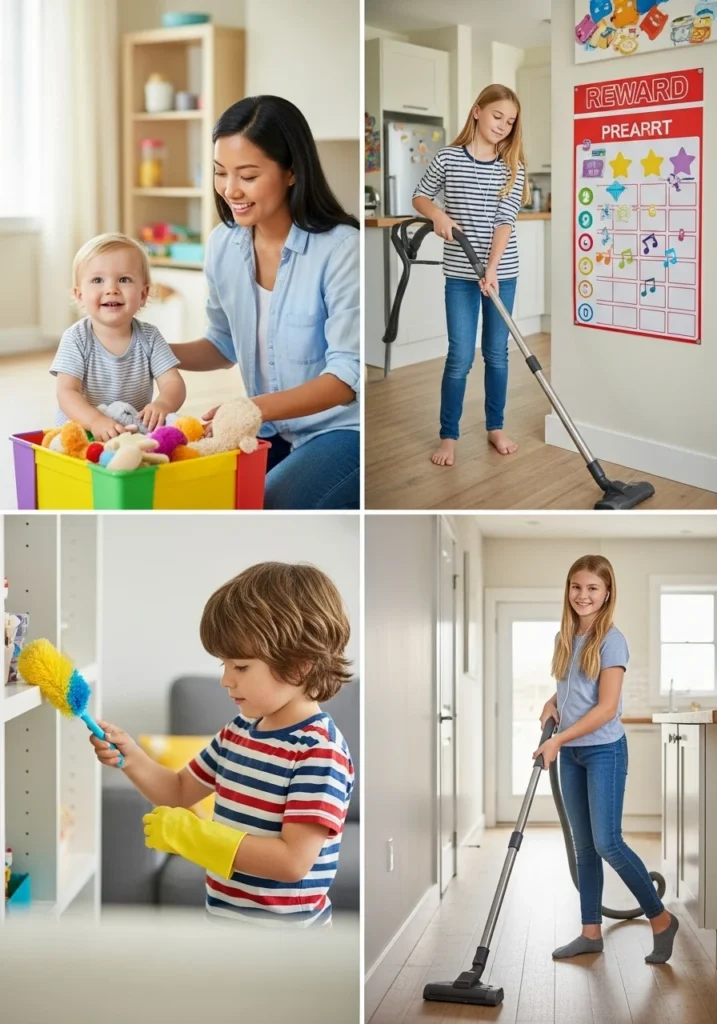
Printable Daily Cleaning Checklist
In the midst of juggling work, family, and daily responsibilities, staying organized can feel like a full-time job. A Printable Daily Cleaning Checklist offers a practical, visual way to stay on top of your cleaning routine, helping you maintain a tidy and organized home with minimal stress. Having a clear, structured guide in front of you allows you to stay focused, track progress, and feel accomplished as you complete each task.
The key to making your checklist work is dividing the day into manageable chunks, assigning specific tasks to different times of the day. With a well-organized checklist, you can easily see what needs to be done and cross off completed tasks, which provides a sense of accomplishment and motivates you to keep going.
Here’s how you can break it down:
Morning Tasks: Get Your Day Started Right (15-30 Minutes)
Start your morning with simple tasks that set the tone for a productive day. A morning cleaning routine doesn’t need to take long but can make a huge difference in how your day unfolds. These tasks are easy to fit into your busy morning and help you feel organized before you head out the door.
Suggested Tasks:
- Make the beds (5 mins): A tidy bed instantly makes the bedroom look neater and is one of the quickest ways to start your day on the right note.
- Wipe bathroom counters (3 mins): A quick swipe of the counters and sinks will prevent toothpaste and soap scum from building up.
- Unload the dishwasher (5 mins): Emptying the dishwasher in the morning makes room for the dishes throughout the day.
- Quick kitchen tidy (5-10 mins): Wipe down counters and put away any leftover items from breakfast.
- Start a load of laundry (2 mins): If you can start a load before heading out, it’ll be ready to switch once you’re home.
Why it helps:
- Keeps your morning streamlined and your space organized.
- Encourages good habits, like making your bed and tidying up after breakfast, to start your day with a clean slate.
Tip: If you’re pressed for time, set a timer for 15 minutes. Race against the clock to see how many tasks you can finish before you leave.
After Work Tasks: Maintain Order (20-30 Minutes)
When you come home from a long day, the last thing you want to do is spend hours cleaning. Your After Work Tasks are designed to be quick and focused, allowing you to maintain order in the home without overwhelming you. These tasks take advantage of the time before dinner and help set the tone for a relaxed evening.
Suggested Tasks:
- Sort mail/school papers (5 mins): Quickly sort through incoming mail and school papers. Toss the junk, file important documents, and organize the rest.
- Switch laundry (5 mins): Move laundry from the washer to the dryer, or hang it to dry. It’s a small task that keeps laundry from piling up.
- Tidy living room (5 mins): Fluff cushions, fold blankets, and pick up any toys or items left out during the day.
- Wipe kitchen after dinner (10 mins): After cooking or eating, quickly wipe down counters, the stove, and any appliances used during meal prep.
- Quick bathroom check (5 mins): Wipe down sinks, mirrors, and counters. A quick check ensures that your bathroom stays fresh and ready for the next day.
Why it helps:
- Helps you keep the home in good shape without needing to devote hours after work.
- Makes the evening feel more relaxing since the house is in order.
- Teaches the whole family that cleaning up is a shared responsibility.
Tip: If you have children, delegate simple tasks like putting away toys or folding towels. You can even create mini “cleaning challenges” to get everyone involved in a fun way!
Evening Tasks: Wind Down Your Day (10-15 Minutes)
Your Evening Wind-Down Tasks are designed to help you prepare for tomorrow while leaving the house neat and organized for the night. By taking care of these tasks each evening, you ensure that you wake up to a clean, clutter-free space, which can help you start your day on a positive note.
Suggested Tasks:
- Put away clothes (5 mins): Fold or hang any clean laundry and put it away. Avoid letting it pile up so it doesn’t become an overwhelming task.
- Prep for tomorrow (5 mins): Pack lunches, lay out clothes, and prep the coffee maker to make your morning routine smoother.
- Quick floor sweep (5 mins): Sweep high-traffic areas like the kitchen and hallway to keep the floors looking clean.
Why it helps:
- Helps set you up for success tomorrow by ensuring you’re ready in the morning.
- Leaves your home feeling calm and orderly, so you can relax before bed.
- Instills a sense of routine and productivity, which can lead to less stress.
Tip: If you feel too tired to do everything, focus on the essentials—put away the laundry and prep the kitchen for the next day. The rest can wait!
Weekly Deep Cleaning Focus: Stay on Track with a Weekly Overview
A printable checklist isn’t just for daily tasks. You can also include a Weekly Deep Cleaning Focus to tackle one or two bigger chores each day, such as mopping the floors or cleaning the bathroom. Breaking down these larger tasks into daily chunks makes deep cleaning more manageable and less overwhelming.
Suggested Weekly Breakdown:
- Monday: Clean bathrooms (toilets, sinks, showers)
- Tuesday: Dust surfaces (furniture, shelves, light fixtures)
- Wednesday: Vacuum bedrooms (including under the bed and furniture)
- Thursday: Mop floors (especially high-traffic areas)
- Friday: Clean kitchen appliances (oven, fridge, microwave)
- Saturday: Declutter a space (closet, pantry, drawer)
- Sunday: Rest day or catch up on anything missed
Why it helps:
- Prevents tasks from accumulating into a huge, time-consuming cleaning marathon.
- Helps you focus on one area at a time so that you don’t get overwhelmed by the thought of cleaning the entire house in one day.
- Keeps your home in tip-top shape with minimal time investment.
Tip: You can laminate your checklist and use a dry-erase marker to mark off completed tasks each day. This allows you to reuse the same checklist week after week and provides an added sense of accomplishment as you check off each task.
Why a Printable Daily Cleaning Checklist Works:
Having a visual checklist in your home provides structure and organization to your cleaning routine. It’s a great tool for keeping you on track and ensuring nothing gets overlooked. By breaking the tasks into morning, after work, and evening segments, it allows you to tackle cleaning in smaller, more manageable chunks. Plus, the satisfaction of checking off completed tasks gives you a tangible sense of progress, which can be motivating and rewarding.
Whether you keep your checklist on the fridge, on a bulletin board, or in a family command center, it will serve as a reminder of what needs to be done and help you stay organized. Using a dry-erase marker or stickers to track your progress adds an interactive, fun element to an otherwise mundane task.
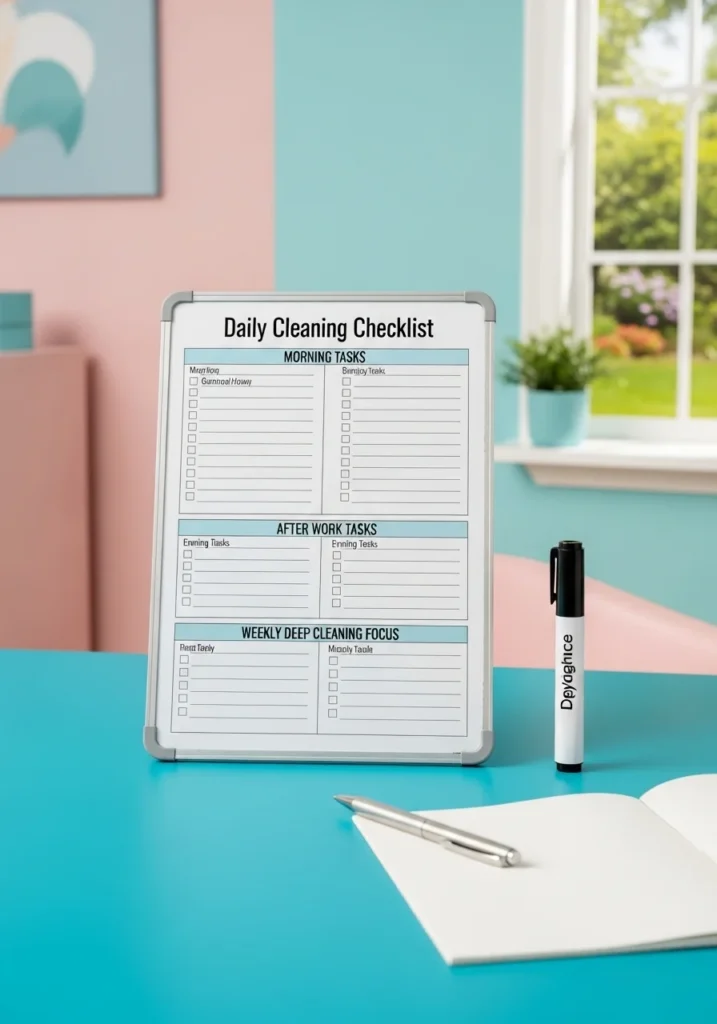
Staying Consistent Without Burnout
As a working mom, finding balance between managing work, taking care of the family, and maintaining a tidy home can be challenging. It’s easy to feel overwhelmed by the sheer volume of tasks that need to be done, and the pressure to “do it all” can lead to feelings of frustration, guilt, and burnout. The good news is that consistency, rather than perfection, is the key to creating a cleaning routine that works for you, your family, and your lifestyle.
While it’s tempting to try and keep everything spotless at all times, aiming for perfection is not only unrealistic but can also be exhausting. The truth is, cleaning doesn’t always need to be flawless—it just needs to be consistent. By focusing on building sustainable habits and being flexible with your schedule, you can maintain a clean home without stressing yourself out. Here’s how you can stay on track while avoiding burnout:
Don’t Aim for Perfection—Aim for Progress
Perfectionism can be a major roadblock to maintaining a cleaning routine. It’s easy to get caught in the cycle of feeling like every task needs to be done perfectly. However, trying to achieve perfection in every cleaning task is not only time-consuming but can also lead to feelings of inadequacy or guilt when things don’t go according to plan. Instead, shift your mindset to focus on progress, not perfection.
Why it helps:
- It allows you to embrace small wins and acknowledge your effort, even if the task isn’t perfect.
- It reduces the pressure to get everything spotless, giving you more breathing room in your day.
- You can celebrate the consistency and the fact that you are actively keeping up with your routine.
Tip: Instead of focusing on “perfectly clean,” ask yourself, “Is this good enough for today?” Even if the laundry isn’t folded neatly or the floors aren’t spotless, you’ve still made progress. A quick sweep through the house and a little daily tidying are all it takes to maintain a functional home.
Build a Flexible, Realistic Schedule
Life is unpredictable. Some days, work is busier than expected, or the kids might need extra attention. A rigid schedule that doesn’t allow room for life’s uncertainties can lead to feelings of overwhelm. The key to consistency is flexibility—having a plan in place but also being kind to yourself when things don’t go as planned.
Why it helps:
- A flexible schedule allows you to prioritize what matters most and make adjustments as needed.
- It helps you stay on top of the routine without feeling the pressure to stick to a strict timeline.
- Gives you permission to adapt your cleaning schedule to fit your current needs, rather than rigidly sticking to a set of tasks.
Tip: If you miss a task, don’t stress. Life happens, and it’s okay to shift tasks around or leave some things for the next day. Instead of trying to catch up by overloading your schedule, use a more realistic approach. If you don’t get to vacuuming today, move it to tomorrow or a designated day later in the week. You’re still keeping your home on track, just in a way that works better for you.
Give Yourself Grace When Things Don’t Go Perfectly
One of the most important aspects of staying consistent without burnout is self-compassion. It’s essential to recognize that you are doing your best, and sometimes, your best will look different each day. Whether it’s a work deadline, a sick child, or an unexpected family event, life will always throw curveballs. When tasks go undone or your cleaning routine gets interrupted, don’t beat yourself up.
Why it helps:
- Self-compassion helps reduce the negative self-talk that can contribute to feelings of burnout and guilt.
- It allows you to reframe your thoughts and see the bigger picture—that maintaining a clean home is a journey, not a destination.
- Taking breaks and being gentle with yourself helps you avoid overwhelm and gives you the mental clarity to stay on track.
Tip: Practice positive affirmations like, “I’m doing my best,” or “I’m working on progress, not perfection.” Remember, it’s okay if things get missed occasionally. It doesn’t mean you’ve failed—it simply means you’re human. Take a deep breath and move forward with self-compassion.
Incorporate Rest and Downtime into Your Schedule
Burnout often occurs when there’s no balance between work, chores, and personal time. It’s easy to think you need to be constantly productive, but rest is just as important as cleaning. When you don’t take time to rest and recharge, you risk losing the energy and motivation to stay on top of your routine.
Why it helps:
- Regular breaks and downtime give you the energy to handle the demands of both work and home life.
- Rest helps improve focus and allows you to be more productive when you do clean.
- It keeps you from feeling like you’re constantly working without feeling a sense of accomplishment.
Tip: Schedule downtime just as you would any cleaning task. Whether it’s taking 15 minutes to read a book, enjoy a cup of tea, or watch your favorite show, make time for activities that recharge your batteries. This will ensure that you stay balanced and ready to tackle your cleaning routine when you’re feeling refreshed.
Use a Checklist to Track Progress, Not Perfection
Sometimes, when you miss a task, it can feel like you’ve fallen off track. However, seeing a visual checklist can help you focus on the tasks you’ve completed, rather than the ones you didn’t get to. It provides a simple way to track progress, not perfection.
Why it helps:
- A checklist serves as a visual reminder of your accomplishments, not just tasks left undone.
- Checking off items from the list, even if it’s just a few each day, can create a sense of achievement.
- It keeps you focused on daily maintenance rather than getting overwhelmed by larger cleaning goals.
Tip: Create a simple checklist (either on paper, a dry-erase board, or digitally) that you can check off daily. Include morning, after-work, and evening tasks, as well as any weekly deep-cleaning goals. Celebrate the small wins as you go! It’s less about getting everything perfect and more about keeping the house in order over time.
Focus on Long-Term Habits, Not Quick Fixes
Rather than focusing on doing everything perfectly in a single day, aim to build long-term habits that are sustainable and fit your lifestyle. Cleaning doesn’t have to be a huge task that requires all your energy. By staying consistent, even with smaller tasks, you create lasting routines that naturally become part of your day-to-day life.
Why it helps:
- Long-term habits prevent the need for intense deep cleans, as smaller daily tasks keep your home tidy.
- Creating habits that fit into your routine ensures you won’t feel like cleaning is taking over your life.
- It keeps your home looking clean and organized with minimal effort, reducing the likelihood of burnout.
Tip: Break tasks down into manageable chunks that fit into your life. If you don’t have 30 minutes to clean, do 10 minutes instead. The goal is consistency, not perfection. Over time, those 10-minute tasks will add up to a well-maintained home without requiring tons of energy.
The Bottom Line: Flexibility and Consistency Lead to Success
Staying consistent with your cleaning routine doesn’t mean you have to be perfect. In fact, perfection isn’t the goal—the goal is a home that’s functional, organized, and welcoming. By giving yourself the flexibility to adapt when life happens and practicing self-compassion, you’ll avoid burnout and keep up with the cleaning routine without feeling overwhelmed. Consistency, not perfection, is the key to maintaining a tidy home that works for you.
Remember, it’s okay if some days are messier than others. Focus on progress and celebrate the effort, not just the results. With this mindset, you can keep your home clean, reduce stress, and create an environment that supports both your work and family life.

Conclusion
Maintaining a clean home as a working mom doesn’t have to mean endless hours of scrubbing, organizing, and stressing over every little detail. The truth is, a spotless home isn’t a prerequisite for a happy, fulfilling life. It’s about creating a routine that works for you and your family—one that reduces stress, saves time, and helps you feel in control without sacrificing precious moments with your loved ones.
A clean home doesn’t require perfection—it requires consistency. By breaking down chores into small, manageable tasks and building a routine that fits your unique schedule, you can keep your home looking neat and organized without feeling overwhelmed. The goal is not to spend hours cleaning each day, but to integrate simple tasks that will keep the house in order with minimal effort. This approach allows you to make cleaning a sustainable part of your daily life, rather than a source of constant stress.
Breaking Tasks Into Manageable Chunks
One of the most powerful strategies for a working mom is dividing cleaning tasks into small, manageable chunks that fit easily into your existing schedule. When you spread tasks throughout the day (or even the week), they become much more doable. Think of your cleaning routine like a puzzle; each task is a small piece that, when completed, creates a bigger picture of a tidy home.
By following a simple morning, after work, and evening routine, you ensure that cleaning doesn’t consume your entire day. Even 10 to 15 minutes of tidying up in the morning, a quick burst of cleaning in the afternoon, and a few minutes before bed can keep your home feeling organized without taking over your life. Breaking tasks down this way ensures you’re making constant progress without feeling like you have to dedicate hours at a time.
Involve the Whole Family
One of the best ways to reduce the burden of cleaning is to get everyone involved. Even young children can pitch in with small tasks, and older kids or teens can help with larger chores like vacuuming, folding laundry, or washing dishes. Not only does this lighten the load for you, but it also helps foster a sense of responsibility in your children. When everyone participates, it creates a team mentality that makes keeping the home tidy a collective effort rather than a one-person job.
Involving your family also creates opportunities for quality bonding time. Rather than spending your evenings and weekends feeling frustrated about cleaning, involve your kids in simple tasks, make it fun with games or challenges, and turn the whole process into something that you can do together. This fosters teamwork, builds responsibility, and even gives you more time to relax and enjoy your loved ones.
Reclaim Your Time and Reduce Stress
The ultimate goal of a cleaning schedule isn’t just to keep your home neat—it’s to give you back your time and peace of mind. When cleaning becomes part of your daily rhythm, you’re not spending your weekends doing massive cleanups or stressing about clutter. Instead, you can enjoy more moments with your family, focus on personal projects, or simply relax without guilt.
Consistency over perfection is the key. When you approach cleaning with a mindset of progress—rather than perfection—you can rest easy knowing that you’ve accomplished something every day. Small wins add up to big results over time, and this can lead to a significant reduction in stress and mental clutter. No more feeling like you’re constantly behind or overwhelmed by a never-ending to-do list.
Start Small, Stay Consistent, and Transform Your Home and Life
It’s easy to get overwhelmed by the idea of cleaning, especially when juggling work and family life. But by adopting a simple, realistic cleaning schedule and making small, consistent efforts each day, you’ll start seeing major improvements in your home’s cleanliness and in your personal well-being.
Remember, it’s not about striving for an immaculate home, but creating a space that feels comfortable, inviting, and easy to maintain. The consistency of your efforts is what makes the difference—not perfection. When you embrace progress over perfection, you’ll be able to focus more on the things that matter most: your health, your family, and your happiness.
Final Thought: A clean, organized home is a byproduct of a system that works for you. By following a routine that incorporates simple daily tasks, involving the family, and embracing flexibility, you can transform your home and life in a way that feels achievable, sustainable, and stress-free. So start small, stay consistent, and enjoy the rewards of a tidy home, a happier family, and more quality time for yourself.
